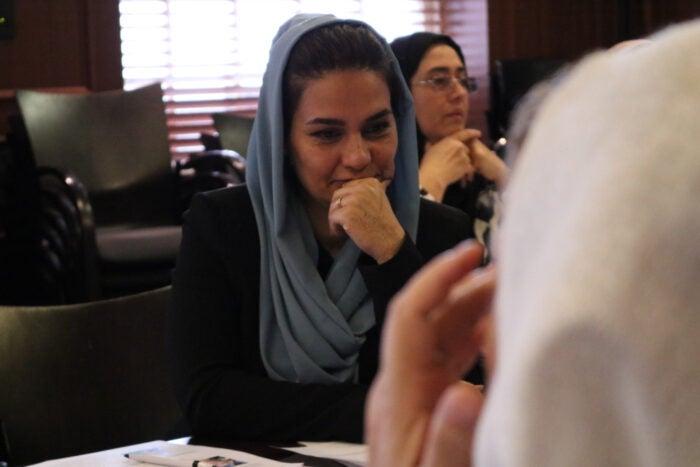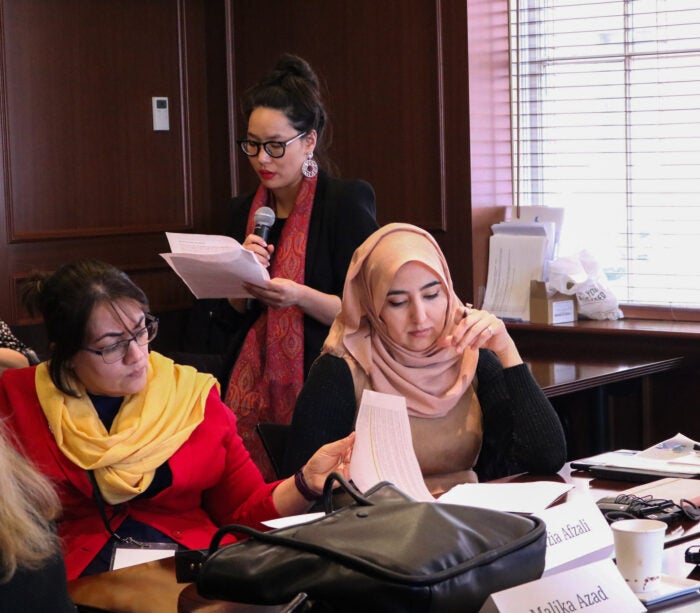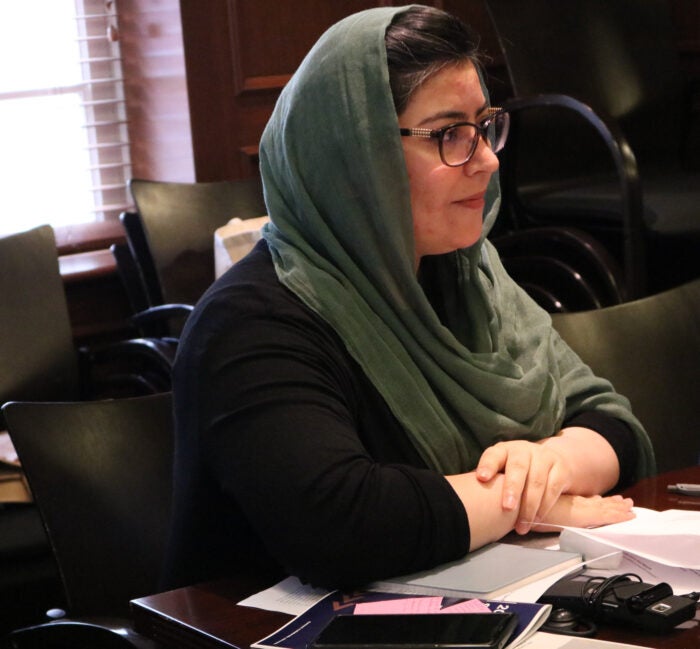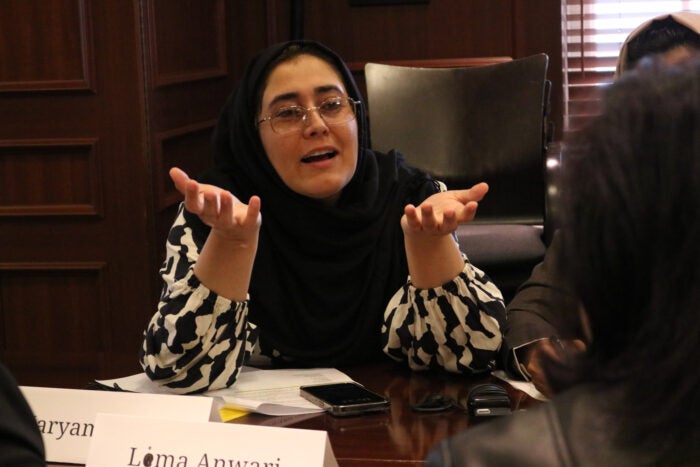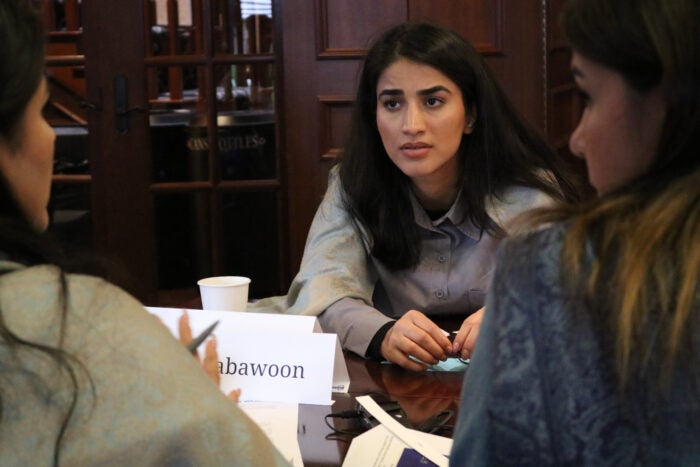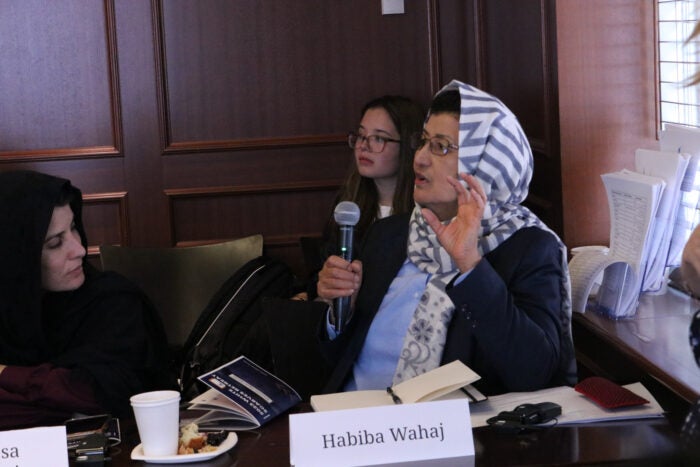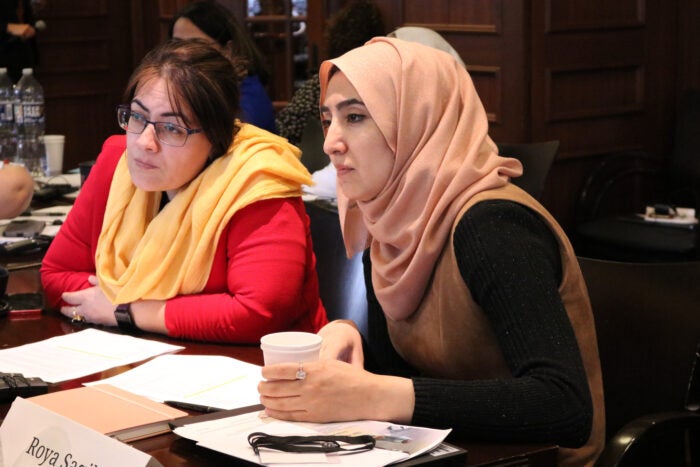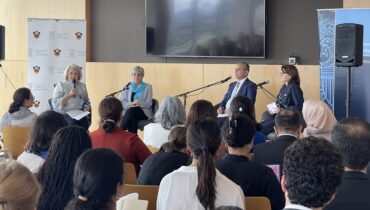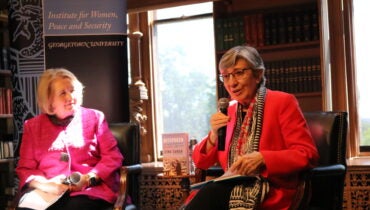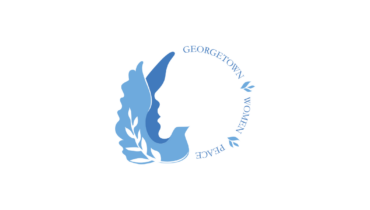Traditional Afghan music played softly in Georgetown University’s Mortara Center on a chilly April morning. As the clock crept towards 9 a.m., groups of Afghan women leaders flooded through the door with joyful chatter and long embraces: it had been a year since the group was last together in Washington, DC.
These women leaders all fled Afghanistan in August 2021 after the Taliban took power. The Georgetown Institute for Women, Peace and Security (GIWPS) created its signature Onward for Afghan Women initiative after working tirelessly with partners to evacuate them from Afghanistan––along with some 1,200 others––because their roles as high-profile activists, journalists, human rights defenders, and government officials made them prime targets of the Taliban.
The mission of the initiative is to equip these exiled leaders with the skills and opportunities to continue their advocacy on behalf of Afghan women and girls.
A key component of the initiative is an annual retreat where the leaders––who now reside across the United States––come together and focus on community care, leadership development, advocacy and action, professional coaching and celebration.
“Each of you deserves to be celebrated for who you are and your service to society,” said executive director of GIWPS, Ambassador Melanne Verveer. “Your continued fight for peace, equality, and democracy is nothing short of extraordinary.”
Each day of the three-day retreat focused on a different theme: answering the call to lead in times of uncertainty, building platforms for change-making, and raising their voices while inspiring others to act. These themes were chosen based on a survey to understand what the community needed and how GIWPS could be most supportive.
“Based on survey results and conversations with our Afghan partners, we decided to bring together advisors on resilience, professional development experts, and advocates to provide tools for Afghan women to continue both their professional work and their personal journey of resettlement in this country,” said Lina Tori Jan, GIWPS Afghanistan Policy Associate.
RESILIENT HEALING AND GROWTH AFTER TRAUMA
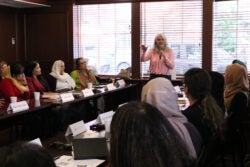
Despite the celebratory setting, the retreat recognized that these Afghan women leaders experienced severe trauma as they fled Afghanistan, and continue to grapple with adjusting to their new lives in the United States amidst the dire situation in Afghanistan, where many still have family.
“The trauma is following us because of the situation in Afghanistan and the new problems that every immigrant faces every day in a new country, new culture, new system and new place,” said Roshan Mashal, Fellow at the University of Texas at Arlington’s Women’s and Gender Studies program.
Saleha Soadat, an award-winning journalist and reporter at Borderless Magazine, left her home and family two years ago with only a backpack on her shoulder. She said she now looks at the news almost every hour.
“I’m physically in the U.S. and mentally in Afghanistan,” said Soadat.
In a workshop focused on resilience and community care, positive psychologist and author Maria Sirois emphasized the importance of holding space for gratitude, self-care, and overcoming challenges as a first step to advocating for others.
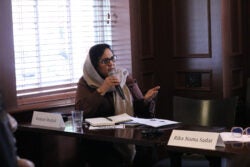
“I was broken when I left my country,” said Mashal. “Thinking positively and my responsibilities for my children, my family, and for my people––especially women and girls––inspired me to work hard.”
Mashal said her biggest accomplishment in the two years since she evacuated Afghanistan is enrolling all of her children in university. She gives some credit for her success to resilience workshops such as Sirois’, where one of the exercises was to envision a slightly better life for yourself and work towards that goal.
“It reminds us that we are alive and we should live for ourselves as well,” reflected Mashal. “If you make yourself healthy, and happy, you can work and help others.”
BUILDING A PROFESSIONAL NETWORK FOR CONTINUED GROWTH
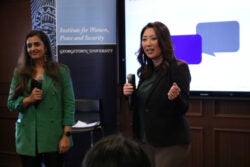
Sessions on networking and resume building were led by Bank of America executives Namrata Yadav and Linh Mai. They provided Afghan women with tools to showcase their extensive achievements in order to further their career development in the United States.
Soadat shared that sessions such as these have helped her journey to continue working.
“When I was in my country I had two jobs, I worked as a journalist for more than 10 years,” she said.
When Soadat arrived in this country, she said the language barrier and new environments were tough to navigate. She attended ESL classes to improve her English and researched journalism jobs every day to try and get a position in her field.
Now, she works as a freelancer for Borderless Magazine and received a scholarship from Texas Tech University to get a master’s degree in mass communication.
“It’s a big achievement. Sometimes even I couldn’t believe it,” she said.
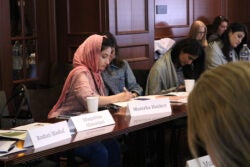
Two leaders from Bank of America—Tiffany Eubanks-Saunders and Jayme VanHorn—led a second workshop on the importance of supporting each other and recognizing conscious and unconscious bias within ourselves and in our communities. The workshop was moderated by Nahela Hadi, a non-profit consultant, leader and creative change maker.
Eubanks-Saunders, a Managing Director at Bank of America, spoke about adversities women—especially women of color and immigrants—face in the workplace.
“When no one else has our back, we must have each other’s back and provide support, empowerment and a strong sense of community,” said Eubanks-Saunders.
Soadat said career development sessions through the retreat helped her create a network, which she deemed as crucial in her career journey and her new fellowship.
ADVOCACY: RAISING OUR VOICES
The retreat included a “policy day” to provide opportunities for the leaders to advocate and strategize.
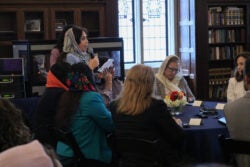
GIWPS offered a space to help the leaders organize their policy recommendations and calls to action based on their expertise in various fields, and then to communicate those recommendations to policy makers and shapers.
This year, one of the main calls to action was to resolve the legal limbo faced by many exiled Afghans in America.
“We are here, we faced a big trauma, we already lost everything. We are starting new here. It is our home,” Mashal said. “They should consider passing this Afghan Adjustment Act to make a smooth pathway for Afghans, especially for women and girls.”
Mashal is referring to a bipartisan bill that would provide a path to permanent residency for the more than 70,000 Afghans residing in the U.S.
The Biden Administration recently introduced a re-parole process that would allow Afghan nationals who arrived in the country through the Operation Allies Welcome program, to continue legally living and working in the United States for another two years––but this temporary solution is not seen as sufficient. The Afghan Adjustment Act was introduced in the last Congress but did not pass; advocates are pushing for the bill to be reintroduced this year.
“We are here, we faced a big trauma, we already lost everything. We are starting new here. It is our home.”
Overall, the retreat was successful in establishing community care and connection while also promoting advocacy, action and professional development. Alicia Burke, a former Senior Vice President of Bank of America, who was present at the first annual retreat in 2022 came back to volunteer at this year’s retreat. Burke said she was amazed by how much the leaders had accomplished in one year and how much she continues to learn from them every day.
“I hope that this serves as another touchstone and set of reinforcements for them in the work that they’re all doing for themselves and for Afghanistan,” she said. “I hope that it can be an experience that continues to touch them and revisits them in positive ways.”
